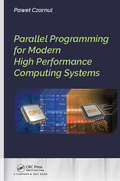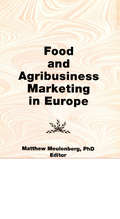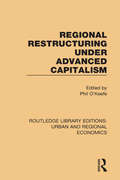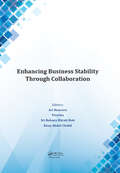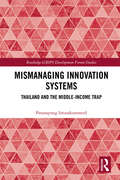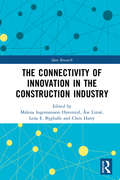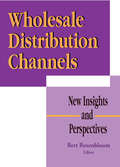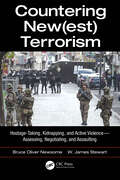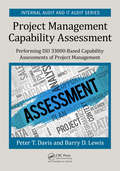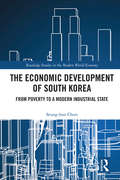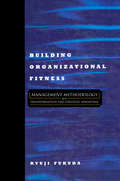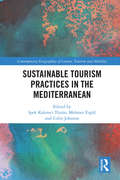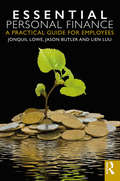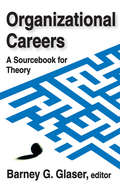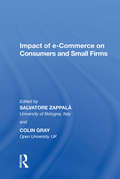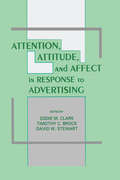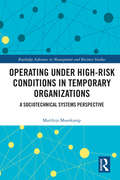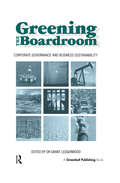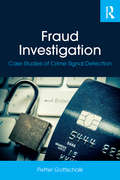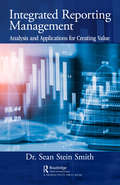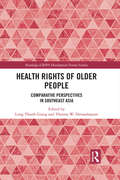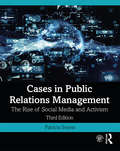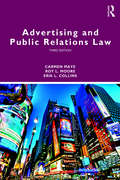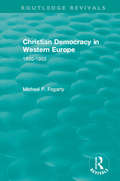- Table View
- List View
Parallel Programming for Modern High Performance Computing Systems
by Pawel CzarnulIn view of the growing presence and popularity of multicore and manycore processors, accelerators, and coprocessors, as well as clusters using such computing devices, the development of efficient parallel applications has become a key challenge to be able to exploit the performance of such systems. This book covers the scope of parallel programming for modern high performance computing systems. It first discusses selected and popular state-of-the-art computing devices and systems available today, These include multicore CPUs, manycore (co)processors, such as Intel Xeon Phi, accelerators, such as GPUs, and clusters, as well as programming models supported on these platforms. It next introduces parallelization through important programming paradigms, such as master-slave, geometric Single Program Multiple Data (SPMD) and divide-and-conquer. The practical and useful elements of the most popular and important APIs for programming parallel HPC systems are discussed, including MPI, OpenMP, Pthreads, CUDA, OpenCL, and OpenACC. It also demonstrates, through selected code listings, how selected APIs can be used to implement important programming paradigms. Furthermore, it shows how the codes can be compiled and executed in a Linux environment. The book also presents hybrid codes that integrate selected APIs for potentially multi-level parallelization and utilization of heterogeneous resources, and it shows how to use modern elements of these APIs. Selected optimization techniques are also included, such as overlapping communication and computations implemented using various APIs. Features: Discusses the popular and currently available computing devices and cluster systems Includes typical paradigms used in parallel programs Explores popular APIs for programming parallel applications Provides code templates that can be used for implementation of paradigms Provides hybrid code examples allowing multi-level parallelization Covers the optimization of parallel programs
Food and Agribusiness Marketing in Europe
by Erdener Kaynak Matthew MeulenbergThis groundbreaking book is the first to provide state-of-the-art information on the current changes and developments in European food and agricultural marketing. Food and Agribusiness Marketing in Europe contains broad and up-to-date coverage of agricultural and food marketing by experts in a variety of European countries including Germany, Greece, Italy, the United Kingdom, France, Ireland, Belgium, the Netherlands, Spain, and Hungary. With chapters selected by the famous marketing specialist Matthew Meulenberg of The Netherlands, this enlightening book allows food and marketing professionals to gain new perspectives on the changing roles of food retailing and food industry in agricultural marketing and the structure of agriculture and food markets.This insightful book introduces readers to the common factors influencing European food marketing today including the stagnating volume of food demand, severe competition between suppliers of agricultural and food products, the overall shift in agricultural marketing towards more market-consumer orientation, and the resulting concern about product development, branding, and customer relationships. Major national differences in food and agricultural marketing in each country are also analyzed, in particular, the problems of implementing European Community legislation in the face of tremendous divergences among member countries in their needs, expectations, and priorities. Some of the other important topics covered in this in-depth book include:European food consumption and consumersfood retailing in Europethe impact of the Common Agricultural policy and other government policies on agricultural marketingthe conduct of agricultural marketing institutions and agribusinesses and their marketing performancesagricultural and food marketing channels in European countries Food and Agribusiness Marketing in Europe is the first resource available that provides essential information on the tremendous changes in food and agricultural marketing in Europe. It is an invaluable reference on European marketing for students and teachers of agricultural marketing, European-oriented agribusiness managers, and internationally oriented agriculture policymakers who need to develop an understanding of food marketing developments in this area of the world.
Regional Restructuring Under Advanced Capitalism (Routledge Library Editions: Urban and Regional Economics)
by Phil O’KeefeOriginally published in 1984. At that time many formerly prosperous regions were becoming impoverished and many former "core" areas were being demoted to peripheral status. This book considers this crisis, its nature and manifestations and its implications. It looks in particular at how the regional crisis affects the socialist analysis of capitalism and it analyses how the crisis affects the political outlook and political actions of the working class in afflicted regions. The theories and analysis put forward apply throughout the world in both advanced and less developed countries.
Enhancing Business Stability Through Collaboration: Proceedings of the International Conference on Business and Management Research (ICBMR 2016), October 25-27, 2016, Lombok, Indonesia
by Ari Kuncoro, Viverita, Sri Rahayu Hijrah Hati & Dony Abdul ChalidBusiness practices in emerging markets are constantly challenged by the dynamic environments that involve stakeholders. This increases the interconnectedness and collaboration as well as spillover effect among business agents, that may increase or hold back economic stability. This phenomenon is captured in this proceedings volume, a collection of selected papers of the 10th ICBMR 2016 Conference, held October 25—27, 2016 in Lombok, Indonesia. This ICBMR’s theme was Enhancing Business Stability through Collaboration, and the contributions discuss theories, conceptual frameworks and empirical evidence of current issues in the areas of Business, Management, Finance, Accounting, Economics, Islamic Economics, and competitiveness. All topics include aspects of multidisciplinarity and complexity of safety in research and education.
Mismanaging Innovation Systems: Thailand and the Middle-income Trap (Routledge-GRIPS Development Forum Studies)
by Patarapong IntarakumnerdOnce recognised as a high-performing newly industrialising Asian economy with the potential for economic and developmental success similar to South Korea, Taiwan, Hong Kong and Singapore, Thailand’s growth rate and competitive edge have declined substantially. With slower adoption and movement towards the knowledge-intensive industries, the loss of the competitive edge is a cause of growing concern among Thai policymakers, with Thailand succumbing to the middle-income trap. This book analyses Thailand’s declining competitiveness in the past 50 years, considering both the national and sectoral roles and capabilities of key players, including the government, universities and research institutes, as well as the electronics, food, and automotive industries. Including comparative analyses with other Asian nations, this book is a must-read for both students and practitioners with interests in development economics, industrial economics and public policy.
The Connectivity of Innovation in the Construction Industry (Spon Research)
by Malena Ingemansson Havenvid Åse Linné Lena E. Bygballe Chris HartyThe construction industry is currently experiencing accelerating developments concerning societal demands along with project complexity, internationalization and digitalization. In an attempt to grasp the consequences of these demands on productivity and innovation, this edited book addresses how innovation is likely to take place with a more long-term perspective on the construction sector. While existing literature focuses on organizational discontinuity and fragmentation as the main reasons for the apparent lack of innovation in the industry, this book highlights the connectivity of construction actors, resources and activities as fundamental for understanding how innovation takes place.Through 15 empirically grounded chapters, the book shows how innovation is part of construction processes on various levels, including project, firm and industry, and that these innovation processes are characterized by organizational and technological connectivity over time. Written by European business management scholars, the chapters cover empirical cases and examples from both a multi-organizational and a multi-international perspective in terms of covering the viewpoints of different industry actors and the contexts of several different European countries including: Sweden, Norway, the UK, Italy, France, Hungary and Poland. By illustrating how connectivity is part of innovation processes in the creation of single-product innovations, of various innovations within and across projects, as well as a fundamental aspect of the processes in which innovations cross nations, the book provides a new angle on how to understand construction innovation and where the industry might (or needs to) be heading next. This book is essential reading for anyone interested in construction management, project management, engineering management, innovation studies, business and management studies.
Wholesale Distribution Channels: New Insights and Perspectives
by Bert RosenbloomBert Rosenbloom has brought together leading academic scholars on wholesale distribution who present state-of-the-art analyses and research on the subject. Their chapters clarify readers’insight and deepen their understanding of this two trillion dollar industry with a wide range of topics. Among those covered in Wholesale Distribution Channels are:improving sales force effectiveness power relationships in wholesale distribution channels wholesalers’liability for defective products the impact of dominant buyers on wholesaling wholesalers as marketing experts transportation cost-effectiveness profitability of wholesalers in vertical marketsReaders will find objective treatment of key issues based on research that provides evidence, not opinion. Many of the authors provide practical recommendations for applying the findings to wholesaling practice. The issues focused on in this book are based on input from the boards of directors representing major wholesale trade associations.
Countering New(est) Terrorism: Hostage-Taking, Kidnapping, and Active Violence — Assessing, Negotiating, and Assaulting
by Bruce Oliver Newsome James W. Stewart Aarefah MosaviHow should we analyze and assess new terrorist behaviors? What are the particular risks and challenges from new terrorism? Should we negotiate with terrorists, and, if so, how? When should we use force against terrorists? Countering New(est) Terrorism: Hostage-Taking, Kidnapping, and Active Violence—Assessing, Negotiating, and Assaulting improves our knowledge of new terrorist behaviors, and our skills in responding to such attacks. The term "new terrorism" has been in circulation since the late 90’s. This book analyzes the "newest terrorism" that has emerged in recent years—characterized by increased hostage-taking, kidnapping, and active violence—and develops best practices for countering these emerging threats. Along the way, it challenges fashionable wishful thinking that all terrorists are open to rational negotiation or de-radicalization, that military responses always reflect badly on the official side, and that terrorists are not constrained by their own doctrines. The new terrorists are dramatically more ideological, murderous, and suicidal. They are generally less reconcilable, less trusting of official negotiators, less likely to release detainees, and more likely to kill detainees. They are less likely to demand ransoms yet more likely to release hostages in cases in which they do demand ransom. They are more informed about the official side’s policies, tactics, techniques, and procedures. They are more likely to use new information and communication technologies against responding agencies and officials. They are more capable fighters—they kill more people despite deploying fewer fighters per hostage. Most disturbing is the fact that they take advantage of free-er societies to access easier targets. Features: Includes evidence-based definitions and descriptions of political, religious, Jihadi, and new terrorism Presents the first large-n comparison of old and new terrorism, using an original extension of the Global Terrorism Database (GTD), with added codes for each of 10,735 hostage crises and more than 500,000 data points from 1970 through 2016 Details a further extension of the GTD covering all terrorist events from 2004 through 2016, roughly 5 million data points. Offers prescriptive advice and visual decision trees on how to negotiate crises, assess the risk of terrorism, and how and when to assault terrorists Reviews official practices, interviews with experienced officials, and real-world simulations of recent terrorist events and attacks Countering New(est) Terrorism will be of interest to researchers, students enrolled in terrorism and Homeland Security programs, crisis negotiators, and police, security, intelligence, and military authorities tasked with counterterrorism and anti-terrorism efforts.
Project Management Capability Assessment: Performing ISO 33000-Based Capability Assessments of Project Management (Security, Audit and Leadership Series)
by Peter T. Davis Barry D. LewisLearn how to perform project management according to international standards of compliance using capability assessment processes. This book compares and contrasts the approach to project management using ISO 21500 against the more direct ISO 33000 Capability Assessment. It shows how to assess projects adequately for process improvement or how well an organization performs against a standard, measurable framework. Using ISO 21500 as the project management reference point and ISO 15504/33000 as the capability assessment reference, the book shows you how to assess whether your projects are being run according to a specific capability level or support them to reach higher levels of capability.
The Economic Development of South Korea: From Poverty to a Modern Industrial State (Routledge Studies in the Modern World Economy)
by Seung-hun ChunHow did a country with a dearth of natural resources, a sprawling population congested in a limited arable land transform itself to a modern industrial state within a generation? How could these have been achieved given the lingering geopolitical threats to its very survival as a state, as evidenced by the Korean War and the internecine aggressive posturing of its neighbor from the north? This book looks at strategies, institutional arrangement, role of entrepreneurs and workers in this odyssey, and on how those factors have worked together through effective leadership to transform South Korea’s economic fortunes.
Building Organizational Fitness: Management Methodology for Transformation and Strategic Advantage
by Ryuji FukudaUndoubtedly, the most urgent task for companies today is to take a hard look at the future. To remain competitive, management must nurture a strong capability for self development and a strong corporate culture, both of which form part of the foundation for improvement. But simply understanding management techniques doesn't mean you know how to use them. You need the tools and technologies for implementation.In Building Organizational Fitness, Ryuji Fukuda extends the power of his managerial engineering methodology into the context of the top management strategic planning role. Published here for the first time, the author provides information on the evolution of his CEDAC methods for use in strategic planning and implementation. The book introduces several key management technologies and describes their successful application in many Japanese, American and European companies, including: P/O (Policy Objective) Matrix, SEDAC (Structure for Enhancing Daily Activities through Creativity), Window Analysis ( a method for classifying and analyzing problem for a view point of management actions required), and Stockless Production (an approach to reduce work-in-process and lead time in an effective and easy-to-understand manner).
Sustainable Tourism Practices in the Mediterranean (Contemporary Geographies of Leisure, Tourism and Mobility)
by Colin Johnson Ipek Kalemci Tüzün Mehmet ErgülSustainable Tourism Practices in the Mediterranean showcases and examines the current and future trends in sustainable tourism in this popular region where tourism is one of the leading determinants of economic development. This volume examines the effects of specific recent events including terrorism, financial crises and various political changes in the Mediterranean region. Looking at a range of destinations, island and mainland, urban and rural, summer and winter and emergent and declining zones, it provides a comprehensive overview of this area. It also draws on a number of wide-ranging themes such as gastronomy, (corporate) social responsibility, entrepreneurship, ethical issues, service quality, health and the slow city, offering an insightful study of the challenges the Mediterranean region faces and the sustainable practices that can be implemented in order to overcome them. Written by leading academics in the field, this book will be of great interest to upper-level students, researchers and academics in Tourism, Development Studies and Geography.
Essential Personal Finance: A Practical Guide for Employees
by Jason Butler Jonquil Lowe Lien LuuThere is increasing pressure for all of us to take responsibility for our own financial security and wellbeing, but we often overlook how the benefits that come with a job can help us do that. Essential Personal Finance: A Practical Guide for Employees focuses on these valuable work benefits and shows how you can build on this important foundation to achieve financial security and your life goals. This unique book explores how making effective and practical use of these work benefits (such as pension scheme, life cover, sick pay, cheap loans, savings schemes and even financial coaching), means facing up to the behavioural biases we are all plagued with. Given that these can get in the way of even the best intentions, Essential Personal Finance tackles these biases head-on with practical ideas and tips for overcoming or harnessing them for good, and will help you to develop a positive and fruitful relationship with your money. With financial stress being a major cause of absenteeism and sick leave, low morale and lost productivity, the advice in this book also offers employers enormous benefits. By empowering employees through financial education and financial awareness, progressive employers will help them feel more in control of their lives, and experience less stress, resulting in higher morale and productivity. Offering a distinctive approach which combines academic insight with practical financial wisdom and tools, this is a must-have book for all employees. It will help you make the most of everything your job has to offer so you can worry less about money and live life to the full.
Organizational Careers: A Sourcebook for Theory
by Barney GlaserAlthough sociologists have written extensively on the broad subject of occupational careers, generally they have referred only incidentally to organizational careers within work organizations. In this pioneering sourcebook, now considered a classic, Glaser gathered from the literature of occupational sociology those studies that bear most directly on organizational careers. His objective was to provide the first survey of the substantial body of data on the subject and to place this data in a framework that illustrates its significance for the development of theory. In an extensive introduction, the editor explains the several purposes of the book and describes in detail the process of comparative analysis through which sociological theory on organizational careers can be generated. Organized around general themes such as recruitment, motivation, commitment, mobility, and succession, the writings of prominent sociologists--including Riesman, Caplow, Hughes, Becker, and Wilensky--form the content of the book and systematically cover every important facet of organizational careers. The editor's introductions to each section of the book alert the reader to the general phenomena--such as processes, conditions, categories, hypotheses, and properties--that crosscut and are generally relevant to all organizational careers and are, therefore, the raw material of theory. These introductions also suggest questions and problems for further analysis and research. This book as a whole stands as a demonstration of the contributors' method of how the sociologist, working from the data of research, can generate grounded, formal theory on this or any social phenomenon. This book also presents a vital body of data on organizational careers and a guide to further research that will be of great use both to occupational sociologists and to all those involved in the study of organizations.
Impact of e-Commerce on Consumers and Small Firms
by Salvatore ZappalaThe change from old to new technologies has fundamentally changed the relationship between the consumer and the firm. This book is at the frontier of behavioural research into how these new commercial realities are borne out in practice, examining the adoption of e-commerce by small firms and the transactional phenomenon that entails access to the Internet. In analyzing the process of e-commerce adoption and why e-commerce actors behave as they do, its coverage includes the adoption of information and communication technologies (ICT) by small firms; the use of ICT applications to support marketing and sales transactions; and the factors that influence consumers' online purchasing decisions.
Attention, Attitude, and Affect in Response To Advertising
by David W. Stewart Timothy C. Brock Eddie M. ClarkLinked from the days of their origins, psychology and advertising developed as independent disciplines at almost the same time in the late nineteenth century. Providing an important arena in which psychologists have tested methods and theories, advertising has been a stimulus for research and development in such diverse specialties as learning and behavioral decision theory, psychometrics, perception, and social and mathematical psychology. Psychology, in turn, has contributed a wide assortment of tools, theories, and techniques to the practice of advertising. These contributions have found their place in virtually all areas of advertising practice -- stimulating creativity, evaluating the creative product, and informing the scheduling of media. Purposely eclectic, this volume presents new issues in consumer psychology and advertising such as the relationship between gender differences, cortical organization and advertising; new approaches to old issues such as attention as an epiphenomenon, and meta-analysis of comparative advertising research; and new applications of consumer psychology to other fields such as examining health behavior as consumer behavior, affect and political advertising, and the relationship between advertising and eating disorders. This volume is the result of the Sixth Annual Advertising and Consumer Behavior Conference, which was designed to bring together researchers and practitioners from both psychology and advertising. Chapter contributions are made by professionals in advertising and marketing, professors in psychology and marketing departments, and psychologists who consult for advertising and marketing organizations. Thus, the chapters represent a microcosm of the type of interaction that has characterized the interface of psychology and advertising for more than a hundred years.
Operating Under High-Risk Conditions in Temporary Organizations: A Sociotechnical Systems Perspective (Routledge Advances in Management and Business Studies)
by Matthijs MoorkampOrganizations increasingly use temporary designs. Many temporary organizations are assembled by "mixing and matching" building blocks from static, bureaucratic, parent organizations into a temporary configuration. At the same time, such "mixed and matched" temporary organizations often operate under difficult and dangerous circumstances. During operations, these temporary organizations can experience numerous internal problems: ranging from friendly fire in a military context to budget and time issues in construction projects and problematic coordination in a crisis management context. This book develops insight into the relationship between a "mixing and matching" temporary design strategy and operational problems. To so do, military and crisis management contexts are systematically studied from a sociotechnical design perspective that emphasizes self-organization to develop organizational controllability. Operating Under High-Risk Conditions in Temporary Organizations demonstrates that a "mixing and matching" design strategy can be related to system failure. Furthermore, it is shown that a process of self-design emerged in which operators attempted to create ad-hoc networks for meaningful, safe and controllable operations. The analyses result in a model that shows mechanisms between characteristics of organizational design and controllability of operations. Not only does this model have relevance to the military and crisis management contexts, relevance is also demonstrated for a broader family of temporary organizations and application of sociotechnical network design theory.
Greening the Boardroom: Corporate Governance and Business Sustainability
by Grant LedgerwoodOn a world scale, the implicit deal between corporation and community is undergoing a revolution in the period 1990–2000. For the first time, corporate boardrooms are having to confront the environmental challenge not as a peripheral issue around "public relations", but as a core issue of credibility with its customers. As trust in big business has declined, consumer willingness to alter buying behaviour to register disapproval has accelerated. As a result, boardrooms in the largest companies are having to redraw their strategic procedures regarding the environment. This book aims to advance the general understanding of corporate environmental governance as an issue capable of separate and detailed analysis. It aims to provide not an overview, but a series of test cores into the generally unexamined issues surrounding the changing ethos of corporate action and environmental investment. To date, the "business and environment" strategic conversation has reached only a minute proportion of a global audience. Over the next twenty years, this dialogue will transform business into the 21st century. Moreover, it will become internalised into a way of working within Corporate Culture. Greening the Boardroom explores through case studies and surveys some of the changes in this process, in Europe as well as in Asia and North America. Suitable for readers in general management, business, government and academia, this book is an important contribution to the corporate environmental debate by the author of The Environmental Audit and Business Strategy: A Total Quality Approach.
Fraud Investigation: Case Studies of Crime Signal Detection
by Petter GottschalkInvestigating white-collar crime is like any other investigation concerned with past events. However, a number of characteristics require a contingent approach to these investigations. This book describes the process of conducting private internal investigations by fraud examiners and presents a number of reports from the United States, Sweden and Norway. It evaluates a number of internal investigation reports to reflect on the practice of fraud examinations. Empirical studies provide a basis to reflect theoretically on practice improvements for fraud examiners. Rather than presenting normative recommendations based on ideal or stereotype situations so often found in existing books, this book develops guidelines based on empirical study of current practice. Internal investigations should uncover the truth about misconduct or crime without damaging the reputation of innocent employees. Typical elements of an inquiry include collection and examination of written and recorded evidence, interviews with suspects and witnesses, data in computer systems, and network forensics. Internal inquiries may take many forms, depending upon the nature of the conduct at issue and the scope of the investigation. There should be recognition at the outset of any investigation that certain materials prepared during the course of the investigation may eventually be subject to disclosure to law enforcement authorities or other third parties. The entire investigation should be conducted with an eye towards preparing a final report. As evidenced in this book, private fraud examiners take on complicated roles in private internal investigations and often fail in their struggle to reconstruct the past in objective ways characterized by integrity and accountability.
Integrated Reporting Management: Analysis and Applications for Creating Value
by Sean Stein SmithIntegrated reporting in corporate communication is a process that results in improved communication, most visibly an ‘integrated report,’ about value creation over time. An integrated report is a concise communication about how an organization’s strategy, governance, performance, and prospects lead to the creation of value over the short, medium, and long term. It represents the integrated summarization of a company’s performance in terms of both financial and other relevant information. Integrated reporting provides greater context for performance data, clarifies how relevant information fits into operations or a business, and may help make decision making better in the long-term. The aim and scope of this book is to provide readers with an overview and analysis of the topics of both integrated financial reporting and a multiple capital model. Analyzing this topic through both a qualitative and quantitative framework, this important business topic is introduced and framed in the context of current market trends, while also including implications for business management professionals. This book provides a thorough examination of the topics of integrated reporting, management ramifications, and opportunities for management professionals. This easy to read and understand book provides numerous take away points, action items and implications. It includes real world examples, sources where more information can be obtained, and direct cause-to-effect examples, making it a valuable resource for readers.
Health Rights of Older People: Comparative Perspectives in Southeast Asia (Routledge-GRIPS Development Forum Studies)
by Long Thanh Giang Theresa W. DevasahayamThe book examines the health rights of older persons who are more likely potentially to face various disadvantages in terms of healthcare access and affordability, thereby impacting on health outcomes. The point of departure in the analyses is that the health security of older persons is guaranteed only if a country approaches the health of its citizens out of moral obligation, viewing health and well-being as a right rather than an entitlement. Data from five countries in the ASEAN region are analysed with the intent of highlighting the health inequalities and barriers at the societal and individual levels, on the one hand, as well as the gaps at the health and healthcare policy and programmatic levels within each country, on the other. It is also intended that the analyses of the data from the selected countries which represent different stages of development, and thus income levels, provide a useful comparative framework for policymakers in the ASEAN region.
Cases in Public Relations Management: The Rise of Social Media and Activism
by Patricia SwannNow in its third edition, Cases in Public Relations Management uses recent cases in strategic communication designed to encourage discussion, debate, and exploration of the options available to today's strategic public relations manager, with the help of extensive supplemental materials. Key features of this text include coverage of the latest controversies in current events, discussion of the ethical issues that have made headlines in recent years, and strategies used by public relations practitioners. The problem-based case study approach encourages readers to assess what they know about communication theory, the public relations process, and management practices. New to the third edition: Eighteen new cases including Snap, Wells Fargo, SeaWorld, United Airlines, and Starbucks. Additional emphasis on social media and social responsibility for communication management today. End-of-chapter activities that reinforce concepts. Developed for advanced students in strategic communication and public relations, this book prepares them for their future careers as communication and public relations professionals. The new edition features a fully enhanced companion website that includes resources for both instructors and students. Instructors will find PowerPoint Lecture Slides, Case Supplements, Instructor Guides, and Answer Keys for Quizzes and End-of-Chapter Activities. Students will benefit from Quizzes, a Glossary, and Case Supplements.
Social Foundations of Contemporary Economics
by Georges Sorel"Readers of economic and political theory as well as students of economic planning will appreciate this classic, now available for the first time in English. Written eighty years ago, when Sorel became disillusioned with the official socialism of the German and French Marxist parties, this new translation presents Sorel's analysis of the rise and fall of the two great modern ideologies: socialism and liberal capitalism. At present, when the fate of both of these ideologies seems in doubt, Sorel's analysis remains particularly insightful and fresh. Sorel explains why they seem to have fallen into disrepute just as they succeeded in an almost total monopoly of power in the advanced industrial countries of the world.Sorel notes a striking parallel in the historical evolution of both bodies of thought: productivity was the foremost ideal when both movements were at their most dynamic and socially effective stage. On the other hand, they were at their most decadent state when they no longer separated themselves from politics and embraced the ideals of social unity. This work is an attack on the time-honored notion of community solidarity whose Platonic and Aristotelian versions find their contemporary counterparts in notions of natural sociability and political obligation. This work anticipates much of the thinking that lies behind Sorel's famous Reflections on Violence and clearly expresses the moral basis of that work, as well as present tendencies in normative and empirical political thought."
Advertising and Public Relations Law (Routledge Communication Series)
by Roy L. Moore Carmen Maye Erik L. CollinsAddressing a critical need, Advertising and Public Relations Law explores the issues and ideas that affect the regulation of advertising and public relations speech, some of the most dynamic and prevalent areas of professional communications today. This updated third edition explores the categorization of different kinds of speech and their varying levels of First Amendment protection as well as common areas of litigation for communicators such as defamation, invasion of privacy, and copyright and trademark infringement. Features of this edition include: A new chapter on Internet-related laws affecting advertising and public relations speech. History and background of major legal theories affecting professional communicators. Extended excerpts from major court decisions. Overviews of relevant federal and state regulatory schemes, including those promulgated and enforced by the FTC, FCC, FDA and others. Appendices providing a legal glossary, a chart of the judicial system, sample model releases and copyright agreement forms. The volume is developed for upper-level undergraduate and graduate students in media, advertising and public relations law or regulation courses. It also serves as an essential reference for advertising and public relations practitioners.
Routledge Revivals: 1820-1953 (Routledge Revivals)
by Michael P. FogartyFirst published in 1957, this book is a detailed analysis on Christian Democracy, a movement backed by Protestants as well as Catholics, which has become one of the great social forces of Western Europe. It is strong in eight countries. The first half of Fogarty’s book sets out what the many Christian-Democratic movements stand for. The second part of the book shows how these movements began, how they have grown, changed, and consolidated, and how they developed into the mid-20th century. This is a broad and useful survey which delves the history, nature and significance of the Christian Democratic movements in Europe. In Fogarty’s analysis, Christian Democracy may indeed bring about a renewed unity of the Christian tradition in Western society.
